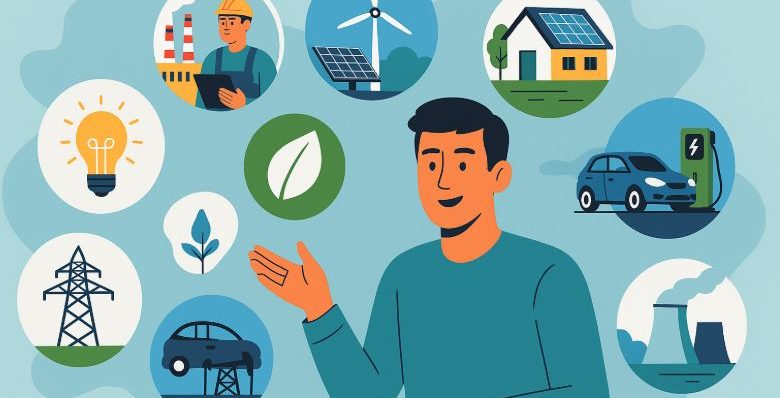Top 10 Energy Companies in the UK
The UK’s energy sector is more than just a network of gas and electricity providers, it is a foundational component of the country’s economy, infrastructure, and environmental future.
With increasing energy demands, climate change commitments, and global energy crises influencing domestic markets, knowing which companies lead the industry offers strategic insight for both households and businesses.
Energy companies not only supply power but also shape public policy, invest in sustainable technologies, and determine how the nation transitions toward renewable resources.
From price competitiveness and smart metering to carbon offsetting and digital services, today’s energy companies operate in a landscape defined by innovation, regulation, and responsibility.
What Role Do Energy Companies Play in the UK Economy?
Energy providers are critical drivers of the UK economy. They contribute through investment, innovation, and the provision of essential services to nearly every sector, from manufacturing and healthcare to transport and education.
The industry’s economic footprint includes:
- Providing employment for over 700,000 individuals across energy production, distribution, and support services.
- Facilitating billions of pounds in infrastructure investment annually, especially in renewable energy projects and the modernisation of the national grid.
- Enabling economic productivity by ensuring reliable energy for businesses and public services.
- Supporting the UK’s commitment to reach net-zero carbon emissions by 2050 through decarbonisation initiatives.
Beyond economic contributions, the energy sector plays a growing role in the nation’s geopolitical and sustainability agenda, particularly in light of shifting global energy dynamics and climate targets.
How Has the UK Energy Market Changed in Recent Years?

Over the past decade, the UK energy market has undergone substantial changes driven by deregulation, digital transformation, and increasing environmental awareness.
Traditionally dominated by the “Big Six” suppliers, British Gas, EDF, E.ON, SSE, ScottishPower, and npower, the market has opened up to new entrants, many of whom focus on green energy and customer-centric services.
This liberalisation has given consumers greater choice and flexibility. Suppliers like Octopus Energy and Bulb disrupted the market by offering 100% renewable electricity, simplified pricing models, and innovative technologies, such as usage-tracking apps and smart tariffs.
Consolidation has also reshaped the landscape. For example, OVO Energy acquired SSE’s retail business, and Octopus Energy took over Bulb’s customer base. These mergers reflect the pressure on smaller firms to compete in a volatile market influenced by wholesale prices, government regulations, and shifting customer expectations.
Another major transformation is the increased use of smart meters and real-time data analytics, helping consumers monitor and reduce their energy use. These trends not only empower customers but also support national efficiency and sustainability goals.
Which Types of Energy Providers Operate in the UK?
Energy companies in the UK are diverse in structure, offerings, and target markets. Generally, providers fall into a few distinct categories:
- Domestic Energy Suppliers cater primarily to households. They offer tariffs for gas and electricity, which may include fixed or variable rates, green energy options, and smart technology features. The majority of UK households are served by a handful of large suppliers, although smaller companies also operate in this space.
- Commercial Energy Suppliers specialise in serving businesses of all sizes. Their services are often more complex, with tailored tariffs based on usage patterns, demand management systems, and account management support. EDF and British Gas are examples of companies offering robust commercial solutions.
- Green Energy Providers focus on supplying electricity generated from renewable sources such as wind, solar, and hydro. Companies like Octopus Energy and ScottishPower are committed to environmental sustainability and have built their reputations around providing carbon-neutral or 100% renewable energy.
- Pay-As-You-Go Energy Suppliers, such as Utilita, target customers who prefer or require prepaid energy services. These suppliers are often used by those with lower credit scores or by landlords managing multiple properties.
What Should Consumers Look For in an Energy Supplier?

Selecting the right energy supplier involves evaluating a number of factors based on individual or business needs.
For residential customers, price and customer service are typically top priorities. For businesses, reliability, commercial rates, and energy efficiency tools may take precedence.
Key factors include:
- Tariff Structure: Suppliers offer fixed, variable, and flexible tariffs. Fixed tariffs provide cost predictability, while variable tariffs reflect market price fluctuations and may lead to savings or higher costs.
- Sustainability: Consumers increasingly prefer companies offering green energy. Many leading suppliers now provide 100% renewable electricity and carbon offset gas tariffs.
- Customer Service: Response time, availability, and resolution effectiveness can vary significantly between providers. Trustpilot, Which?, and Citizens Advice offer customer service rankings.
- Smart Technology: Companies that provide smart meters and apps allow customers to monitor consumption in real time and adjust their habits to reduce bills.
- Ease of Switching: With Ofgem regulations in place, switching providers is now straightforward, but ease and clarity still vary between suppliers.
Why Are Green Energy Companies Gaining Popularity?
The popularity of green energy companies has surged due to a combination of environmental awareness, regulatory support, and technological advancements. Consumers are increasingly seeking eco-friendly alternatives, and providers are responding with sustainable offerings.
Government initiatives, such as the Renewable Obligation and Feed-in Tariff schemes, have supported the growth of renewable capacity.
Energy providers like Octopus and OVO have adopted business models that not only meet legal requirements but also appeal to environmentally conscious customers.
Moreover, the integration of technology, such as smart home systems, dynamic pricing, and real-time usage tracking, has made green energy more accessible and convenient. These innovations make it easier for consumers to understand their impact and reduce their carbon footprint.
The Top 10 Energy Companies in the UK (2025 Edition)
1. British Gas

British Gas remains the UK’s most recognisable and largest domestic energy provider. With a legacy that dates back centuries, British Gas continues to lead the market by offering a comprehensive range of energy and home services. The company currently supports over 10 million customers and employs more than 6,500 expert engineers nationwide.
British Gas operates with a core focus on reliability, accessibility, and innovation. It provides gas and electricity tariffs tailored to both standard and smart meter users, along with extensive customer support available seven days a week.
Beyond energy supply, British Gas has positioned itself as a total home solutions provider. Its range of services includes new boilers and heating installations, home repair support, and insulation upgrades to improve energy efficiency. Homeowners can also benefit from the Home Health Check, which assesses a property’s overall energy performance.
The company is playing an increasingly important role in the UK’s transition to net zero. It offers:
- Smart meters to help customers track and reduce energy usage
- Heat pump installations as a low-carbon alternative to gas boilers
- Solar panels and home battery systems to generate and store renewable energy
- Electric vehicle (EV) charging solutions for modern mobility needs
- Home insulation services to improve thermal efficiency and reduce energy bills
With this end-to-end approach, British Gas not only provides energy but empowers customers to become more energy-conscious and environmentally responsible.
2. EDF Energy

EDF Energy is a major player in the UK energy market, known for its leadership in low-carbon electricity and innovation in energy efficiency. A subsidiary of the French EDF Group, the company combines the stability of traditional energy sources with a strong commitment to renewable technology and carbon reduction.
One of its standout initiatives is the Sunday Saver challenge, which encourages customers to shift their weekday energy consumption in exchange for free electricity on Sundays. This not only helps reduce pressure on the national grid during peak times but also cuts emissions and customer bills, a win-win for sustainability and affordability.
EDF is investing heavily in smart home upgrades and low-carbon technologies. Key offerings include:
- Smart meters provide half-hourly usage readings and empower customers to monitor their energy consumption in real time.
- Air source heat pumps serve as energy-efficient alternatives to traditional heating systems. As a Which? Trusted Trader, EDF installs these with prices starting from £4,580 (including government grants).
- Solar panels and batteries are designed to significantly reduce or even eliminate electricity bills. Customers can also take advantage of the Empower Exclusive tariff, aimed at solar users.
- Home insulation solutions are supported by government schemes like ECO4 and the Great British Insulation Scheme. Eligible customers may qualify for partial or full funding depending on their EPC rating.
EDF is also actively supporting the electric vehicle transition. The GoElectric Overnight tariff is among the UK’s cheapest fixed-rate EV tariffs, offering zero-carbon charging solutions. From leasing EVs to installing home charging points, EDF provides a full suite of services for drivers making the switch to cleaner transport.
3. E.ON UK

E.ON UK has firmly positioned itself as a sustainability-focused energy supplier committed to reducing carbon emissions and making smart, efficient energy accessible to all. Operating under the E.ON Next brand, the company delivers gas and electricity services that integrate renewable energy generation, home energy upgrades, and cutting-edge technology.
E.ON is at the forefront of supporting the UK government’s net-zero strategy. The company helps customers enhance their home’s energy performance through a number of targeted services:
- Solar panels and battery systems, enabling customers to generate and store their own electricity, reducing dependency on the national grid.
- Heat pump installations as part of the UK’s move away from fossil fuels for heating. These provide an efficient and sustainable way to heat homes year-round.
- Smart meters to monitor real-time consumption and improve energy efficiency.
- Grants and funding access for qualifying customers looking to upgrade insulation or install green technologies, often covering a significant portion of costs.
Beyond its residential offerings, E.ON also provides business-focused services under the npower Business Solutions (nBS) arm. Here, E.ON assists large organisations with contract procurement, carbon reduction strategies, and infrastructure development, offering consultancy and long-term energy partnerships.
E.ON’s dual focus on domestic and commercial solutions ensures it remains a top-tier player across all sectors of the UK energy market.
4. ScottishPower

ScottishPower, part of the Iberdrola Group, is one of the UK’s leading energy suppliers with a strong focus on renewable electricity and customer savings. Known for its environmental initiatives, the company now supplies 100% renewable electricity to all residential customers and continues to invest in onshore and offshore wind energy.
A key differentiator is the company’s Power Saver Tariff, which offers customers half-price electricity every Saturday and Sunday from 11am to 4pm. This initiative helps customers reduce bills while encouraging more sustainable consumption patterns.
ScottishPower’s broader service offering includes:
- Solar energy solutions, including panel and battery installation, smart export guarantees, and solar savings consultations.
- Heating upgrades, particularly air source heat pumps, supported by the Heat Pump Saver Tariff and a heat pump service plan. Customers can potentially save up to £600 annually on heating costs.
- Smart home integrations such as the Tado smart thermostat, which promises savings of up to 30%, and smart hot water control systems for additional efficiency.
- Boiler care and home protection plans via its Home Services division, which also offers plumbing and appliance protection.
- EV charging services, including the EV Saver Tariff, an EV one-stop shop for vehicle chargers, and tools for smart charging optimisation.
ScottishPower’s blend of affordability, green energy, and home service innovation makes it one of the most well-rounded providers in the current energy market.
5. Octopus Energy

Octopus Energy has rapidly earned a reputation as one of the UK’s most innovative and customer-friendly energy companies. Built on technology and sustainability, the company is a frontrunner in offering cheaper, greener solutions for both homes and electric vehicles.
Its hallmark offering is the Cosy 6 heat pump, developed and installed in-house. This next-generation heating solution is up to four times more efficient than a gas boiler and qualifies for the £7,500 government grant. Octopus promotes a simple, streamlined upgrade experience, helping customers save up to £264 a year on energy bills.
Octopus is also one of the few suppliers offering solar panel and battery packages with the potential to reduce electricity bills by up to 90%. Their smart solar tariffs allow users to sell excess energy back to the grid, providing a further financial return on investment. With high-quality panels and a 25-year warranty, Octopus offers a reliable path to self-generated energy.
When it comes to electric vehicles, Octopus provides:
- A Salary Sacrifice Scheme that enables employees to save up to 40% on a new EV.
- A curated selection of the latest electric vehicles and integrated home charging solutions.
- Smart EV tariffs that can reduce home charging costs by up to 70%, using off-peak charging strategies and intelligent load management.
Customer service is another key strength of Octopus Energy. It consistently ranks highest in UK energy provider satisfaction surveys, largely due to its transparent pricing, responsive support teams, and user-friendly mobile apps.
6. SSE (Now OVO Energy)

SSE, now integrated with OVO Energy for retail services, continues to play a critical role in the UK’s energy transition through its infrastructure and generation divisions. While OVO handles customer-facing energy supply, SSE’s legacy operations remain highly influential in power generation, transmission, and large-scale renewable energy development.
Through SSE Renewables, the company operates 10 offshore wind farms and 51 onshore wind farms across the UK and Ireland. These include strategic developments like Dogger Bank, the world’s largest offshore wind farm currently under construction. The company is also actively developing floating offshore wind capacity, with projects such as Ossian, a 3.6GW wind farm off the coast of Scotland.
Hydropower remains another cornerstone of SSE’s low-carbon generation strategy. The company operates over 1,150 MW of conventional hydro and 300 MW of flexible pumped storage, and is developing Coire Glas, the first large-scale pumped storage scheme in the UK in over 40 years.
In solar and battery storage, SSE is building momentum. It currently has a 30MW solar farm in development and is planning over 1.2GW in solar and battery projects.
One of the flagship battery storage projects is Fiddlers Ferry, located at the site of a former coal-fired power station, marking SSE’s commitment to decarbonisation and repurposing.
SSE Thermal supports more than 7.4GW of gas-fired generation capacity and is heavily invested in carbon capture and storage (CCS) and hydrogen technologies. Projects like Keadby 3 aim to become among the UK’s first fully operational carbon capture power stations before 2030.
On the infrastructure side, SSEN Transmission operates the high-voltage network across the north of Scotland and is a key player in integrating over 9GW of renewable energy into the grid. Meanwhile, SSEN Distribution serves over 3.8 million customers and maintains more than 128,000 km of power lines across Scotland and southern England.
SSE’s multi-pronged strategy, spanning wind, hydro, solar, battery storage, thermal power, and transmission infrastructure, demonstrates its critical role in delivering a resilient, low-carbon energy system.
7. OVO Energy

OVO Energy, which took over SSE’s retail operations, has become one of the UK’s most recognisable and sustainability-driven energy suppliers. Committed to “doing energy differently,” OVO blends affordable pricing with bold environmental initiatives aimed at reducing household carbon emissions.
OVO’s Beyond platform offers customers compelling incentives, such as:
- Two hours of free electricity per week
- A chance to win a year’s free energy
- Free solar panel installations for select customers
In addition, its Fix and Cover tariff bundles fixed-rate electricity with boiler cover, offering peace of mind during volatile energy markets. Tariffs are competitively priced and cater to a variety of usage patterns, payment methods, and meter types.
OVO also supports electric vehicle (EV) drivers with rewards like 30,000 free EV miles for customers purchasing selected vehicles such as Volkswagen, Audi, CUPRA, and Škoda.
A standout element of OVO’s offering is its simplified and transparent pricing structure. The company provides:
| Tariff Type | Payment Method | Electric Unit Rate (p/kWh) | Gas Unit Rate (p/kWh) | Standing Charge (p/day) | Exit Fee |
| Simpler Energy (DD) | Direct Debit | 25.21 | 6.73 | 43.99 | £0 |
| Pay As You Go (Standard) | PAYG | 24.42 | 6.56 | 43.99 | £0 |
| 1 Year Fixed (Loyalty) | Direct Debit | 22.17 | 5.70 | 47.38 | £50 |
| Economy 7 | Various | Peak: 26.95 / Off-peak: 20.15 | , | 43.83 – 48.74 | £0–£50 |
OVO is also heavily involved in carbon offsetting and community engagement initiatives. It invests in global reforestation projects and renewable infrastructure to help offset household emissions, bringing it closer to its goal of becoming a fully carbon-neutral supplier.
8. National Grid

National Grid is one of the UK’s most vital energy infrastructure operators, responsible for maintaining and upgrading the country’s electricity transmission network.
It manages over 7,000 km of overhead lines, 700 km of underground cable, more than 22,000 pylons, and 300 substations, ensuring power is reliably distributed to homes and businesses across England and Wales.
As part of its RIIO-T3 business plan (2026–2031), National Grid has committed to a £35 billion investment in modernising and decarbonising the UK’s grid. This plan represents the most significant upgrade to the country’s electricity infrastructure in a generation and is vital for supporting growing renewable energy capacity.
Key responsibilities and initiatives include:
- Substations and Pylons: Maintaining the physical infrastructure that supports grid resilience and ensures reliability across urban and rural areas.
- Control Centre: Operating the Transmission Network Control Centre, which runs 24/7 to keep electricity flowing under all conditions, including extreme weather.
- Environmental Stewardship: Reducing impact on wildlife habitats and natural landscapes by developing greener engineering solutions.
- Grid Modernisation: Enhancing capacity to integrate wind, solar, and other renewable sources efficiently and securely.
National Grid plays an essential role in the national push toward net zero, acting as the backbone of the UK’s electricity system by facilitating safe, consistent, and low-carbon power delivery.
9. Shell Energy

Shell Energy offers a highly diversified energy portfolio that spans from domestic supply to complex business and industrial energy solutions. Backed by one of the world’s largest energy companies, Shell Energy is driving the transition to smarter, cleaner, and more integrated energy systems.
Shell Energy supports both small businesses and large enterprises with:
- Electricity and gas supply backed by one of the world’s most sophisticated trading operations
- Energy efficiency upgrades, including HVAC optimisation and lighting retrofits
- Renewable energy options, such as green electricity contracts and solar installations
- Energy management through data analytics and automated control systems
- Backup generation systems that ensure resilience and continuity during power disruptions
For enterprise clients, Shell also provides advanced asset management services to optimise uptime and regulatory compliance, as well as demand response programs that allow businesses to earn revenue while contributing to grid stability.
Shell Energy’s expanding EV charging optimisation solutions make it a key player in the mobility sector, offering tailored infrastructure for electric vehicle fleets. It also supports on-site renewable energy generation, enabling commercial clients to reduce reliance on the grid and lower emissions.
Shell Energy’s fully integrated approach, from generation and supply to analytics and risk mitigation, makes it an attractive choice for forward-thinking businesses seeking both performance and sustainability.
10. Utilita Energy

Utilita Energy has carved a niche in the UK market as a specialist in pay-as-you-go (PAYG) energy. Catering primarily to low-income households and customers who value control and transparency in their energy usage, Utilita has become a go-to provider for prepayment energy solutions.
The company’s smart PAYG model allows customers to track usage, manage top-ups via an app, and avoid unexpected bills. This is particularly beneficial during cost-of-living challenges, where household budgeting becomes more critical.
Utilita also offers:
- Smart meters to all customers as standard, providing visibility over real-time usage
- Energy-saving advice through its Energy Hub app
- Home energy efficiency consultations for vulnerable and low-income customers
- Emergency top-up credits for prepay customers in financial hardship
In addition to residential services, Utilita is investing in community energy education and outreach through its Utilita Giving initiative, which funds local programmes and partners with charities to combat fuel poverty.
Although it doesn’t operate in the commercial energy space, Utilita’s deep focus on affordability, energy education, and innovative PAYG technology makes it a vital part of the UK energy landscape.
Comparison Table: Top 10 Energy Companies in the UK
| Energy Company | Type of Services Offered | Renewable Energy Focus | Smart Technology & Meters | Customer Rewards & Tariffs | Best Suited For |
| British Gas | Gas, electricity, boiler cover, home repairs | Offers green tariffs and solar panels | Smart meters, EV charging, smart heating | Fixed tariffs, boiler bundles, loyalty perks | Households wanting full home support |
| EDF Energy | Gas, electricity, solar, EV, heat pumps | Strong focus on nuclear and renewables | Smart meters, solar & battery storage | Sunday Saver: free electricity, EV plans | Eco-conscious homes and small businesses |
| E.ON UK | Gas, electricity, solar, batteries, heat pumps | 100% green electricity for homes | Smart meters, solar tech integration | Fixed and flexible tariffs, business rates | Families and SMEs seeking green energy |
| ScottishPower | Electricity, gas, solar, EV, home services | 100% renewable electricity | Smart thermostats, hot water control | Weekend saver tariffs, EV bundles | Green homes and EV owners |
| Octopus Energy | Electricity, gas, solar, EV, heat pumps | 100% renewable and carbon neutral | Smart tariffs, solar apps, usage tools | Salary Sacrifice EV, flexible solar tariffs | Tech-savvy, green-first consumers |
| SSE (OVO Energy) | Infrastructure, generation, renewables | Offshore, onshore wind, hydro, solar | Limited to commercial/infra-level tech | Not retail-focused since merger with OVO | Grid and infrastructure development |
| OVO Energy | Gas, electricity, solar, EV, smart tariffs | Carbon neutral + offsetting programs | Smart meters, solar integrations | Free EV miles, 2 hrs free electricity weekly | Budget-conscious, green-leaning homes |
| National Grid | Transmission network operations | Supports grid-wide renewable transition | Control centres, grid management systems | Not applicable to retail energy supply | National infrastructure and utilities |
| Shell Energy | Gas, electricity, business energy solutions | Offers green electricity and solar | Data analytics, EV charging, backup power | Integrated commercial energy solutions | Large businesses and commercial users |
| Utilita Energy | Prepay electricity and gas services | Basic green energy participation | Smart PAYG meters standard | Emergency top-ups, budgeting tools | PAYG customers, low-income households |
How to Choose a Suitable Energy Supplier for You?
With so many energy suppliers operating in the UK, choosing the right one depends on your specific needs, values, and consumption patterns.
Whether you’re a homeowner, tenant, or business owner, a careful assessment of key criteria can help you find a provider that balances cost, service quality, and sustainability.
1. Understand Your Energy Usage
Before switching or selecting a supplier, analyse your historical usage. Smart meters and recent bills provide an accurate view of how much gas and electricity you use monthly or annually. This helps in choosing the most economical tariff.
2. Compare Tariffs and Pricing Structures
Look beyond headline prices. Compare:
- Unit rates (pence per kWh)
- Standing charges (daily fixed costs)
- Fixed vs. variable tariffs
- Dual fuel discounts
- Exit fees for switching
If you use energy at off-peak times, consider Economy 7 or multi-rate tariffs.
3. Assess Customer Service Ratings
Reliable customer support can make a significant difference during disputes, outages, or tariff changes. Check Trustpilot, Citizens Advice, or Which? reviews for real user experiences.
4. Check for Green Credentials
If sustainability is important to you, choose a supplier offering:
- 100% renewable electricity
- Carbon offset gas
- Green tariffs backed by REGO (Renewable Energy Guarantee of Origin) certificates
Companies like Octopus, OVO, and ScottishPower lead in this area.
5. Review Technology and Smart Features
Choose a supplier that offers:
- Smart meter installation
- Usage tracking apps
- Energy-saving tips and tools
- Integration with EV chargers, solar panels, or battery storage (if applicable)
6. Evaluate Contract Flexibility
Some tariffs offer zero exit fees or no long-term contracts, allowing you to switch without penalty. This is ideal in a volatile market.
7. Consider Additional Services
Some providers bundle energy with:
- Boiler cover or repair services
- Home insulation and efficiency upgrades
- EV charging solutions
- Solar panel and battery packages
Choosing a supplier that offers integrated services may save you time and money in the long run.
Conclusion
The UK energy market is more competitive and diverse than ever before, offering a wide range of options for consumers and businesses alike.
Whether you prioritise price, customer service, or environmental impact, the top energy companies in the UK provide compelling value through innovation, green technology, and flexible tariffs.
From infrastructure giants like National Grid and SSE to customer-focused disruptors like Octopus and OVO, each supplier plays a vital role in shaping the future of energy in Britain.
As a consumer, understanding your needs and comparing offers carefully is the best way to take control of your energy use, reduce your carbon footprint, and potentially save money.
FAQs About Energy Suppliers in the UK
What’s the difference between a fixed and variable energy tariff?
A fixed tariff locks in your unit rate for a set period, offering price stability. A variable tariff changes based on the energy market.
Do all suppliers offer smart meters?
Yes, all major UK energy suppliers are required to offer smart meters under the government rollout scheme.
Can I switch energy suppliers with a smart meter?
Yes, most smart meters (especially SMETS2) remain fully functional when switching to a new supplier.
What is the cheapest energy supplier in the UK?
Prices vary, but OVO, Octopus, and Utilita often offer some of the most competitive rates. Always compare tariffs based on your usage.
How do I switch energy suppliers?
Use a price comparison tool or go directly to the supplier’s website. Switching is free, usually takes 5–21 days, and there’s no supply disruption.
Are green energy tariffs more expensive?
Not necessarily. Many green tariffs are competitively priced, especially from companies like Octopus, OVO, and ScottishPower.
Can businesses access renewable energy too?
Yes, many providers offer bespoke renewable energy contracts for businesses, often combined with carbon reporting tools and efficiency support.


